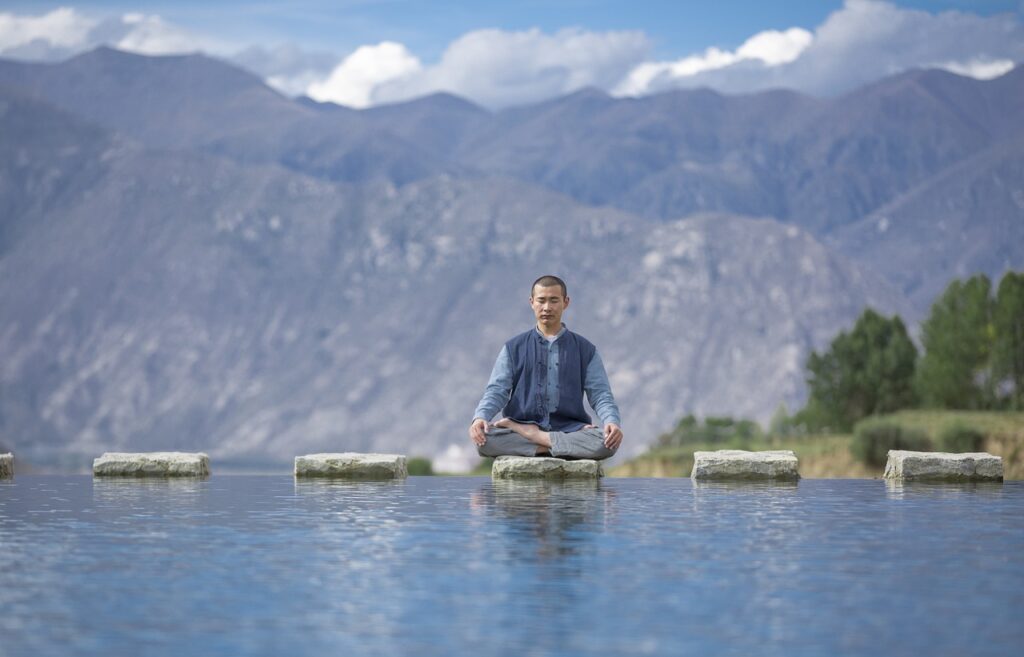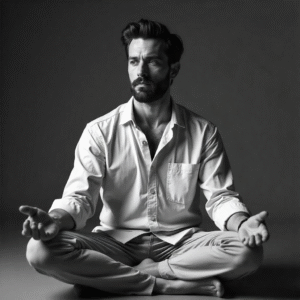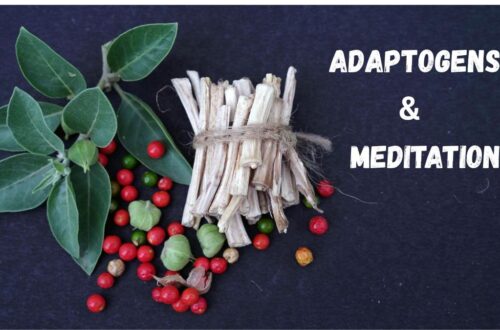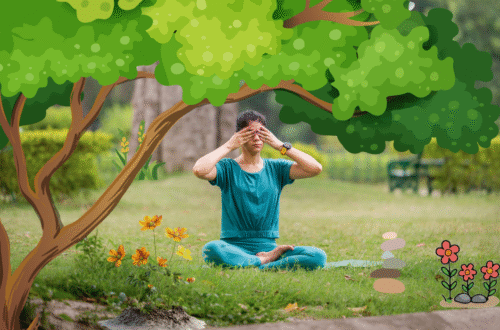
Vipassana meditation is for stress and anxiety relief. If being overwhelmed has become your default setting and anxiety is a constant background noise, you’re not alone. Modern life is an endless sprint, and many are reaching for quick fixes. But what if the most powerful antidote is something ancient, silent, and inward-facing? Vipassana meditation is gaining global momentum—not as a trend, but as a proven tool to heal chronic stress and anxiety from the root
The Science of Stress and Anxiety
What Happens in the Body During Chronic Stress
When you encounter a stressful situation, your body’s natural survival mechanism—the fight-or-flight response—kicks in. This response is orchestrated by the sympathetic nervous system, which floods your body with stress hormones such as cortisol and adrenaline. In the short term, this reaction is incredibly useful: it sharpens your focus, increases your heart rate, and tenses your muscles, preparing you to face immediate threats.
However, when stress becomes a constant presence in your life, this biological response doesn’t get a chance to turn off. Chronic stress keeps your cortisol levels elevated, your heart working overtime, and your muscles in a state of persistent tension. Over time, this ongoing activation can have serious consequences:
-
Sleep Disruption: High cortisol levels interfere with your ability to fall asleep and stay asleep, leading to insomnia or poor-quality rest.
-
Digestive Issues: Chronic stress diverts blood away from your digestive system, causing problems like indigestion, bloating, or even irritable bowel syndrome (IBS).
-
Weakened Immunity: Prolonged stress suppresses immune function, making you more vulnerable to infections and slower to recover from illness.
-
Increased Risk of Chronic Disease: Elevated stress hormones contribute to high blood pressure, cardiovascular disease, and even metabolic disorders like diabetes.
In essence, what starts as a helpful survival mechanism can, when left unchecked, harm nearly every system in your body.
Acute vs. Chronic Anxiety

It’s important to distinguish between acute and chronic anxiety, as they affect the mind and body in different ways:
Acute Anxiety:
This form of anxiety is a natural, short-lived response to a specific event or challenge—think of the nerves you feel before a big presentation or a job interview. Acute anxiety typically fades once the situation resolves, and your body returns to its baseline state.
Chronic Anxiety:
Chronic anxiety, on the other hand, is persistent and often disproportionate to any actual threat. It lingers for weeks, months, or even years, gradually seeping into every aspect of your life. Unlike acute anxiety, which is tied to specific triggers, chronic anxiety can feel ever-present and overwhelming. Its effects are far-reaching:
-
Sleep Disturbances: Racing thoughts and physical tension make restful sleep elusive.
-
Digestive Upset: Ongoing anxiety can cause chronic stomachaches, nausea, or changes in appetite.
-
Impaired Focus and Productivity: Worry and rumination sap your mental energy, making it difficult to concentrate or get things done.
-
Reduced Quality of Life: Chronic anxiety can diminish your sense of joy, fulfillment, and overall well-being.
The difference is clear: while acute anxiety is a fleeting visitor, chronic anxiety becomes an unwelcome, long-term guest.
The Long-Term Impact of Stress and Why Early Intervention Matters
If chronic stress and anxiety remain unaddressed, their effects can accumulate and cause lasting harm—physically, mentally, and emotionally.
Hormonal Imbalance:
Prolonged exposure to elevated stress hormones disrupts your body’s natural rhythms. This can lead to adrenal fatigue, hormonal imbalances, and even reproductive issues in both men and women.
Weakened Immune System:
The immune system is highly sensitive to stress. Chronic stress suppresses immune function, making you more susceptible to infections, allergies, and autoimmune conditions. Your body’s ability to heal and recover is also compromised.
Brain Changes:
Perhaps most concerning, ongoing stress can alter your brain’s structure and function. Studies have shown that chronic stress can shrink the hippocampus—the region responsible for memory and emotional regulation—while strengthening the neural pathways associated with fear and anxiety. This makes it harder to manage stress over time, creating a vicious cycle.
Cardiovascular Strain:
High blood pressure, increased heart rate, and inflammation all contribute to a greater risk of heart disease and stroke in those experiencing long-term stress.
Emotional and Psychological Toll:
Beyond the physical effects, chronic stress and anxiety can erode your sense of self-worth, strain relationships, and lead to depression or burnout.

Why Traditional Solutions Aren’t Enough
Medication Can Be a Crutch, Not a Cure
While antidepressants and anti-anxiety medications can offer crucial relief—sometimes even saving lives—they often function as temporary measures rather than long-term solutions. Medications do not equip the mind with tools for self-regulation or resilience, so when the prescription ends or loses effectiveness, the root issues often remain unresolved. These drugs may help manage symptoms in the short term, but they do not address the underlying patterns of thought and emotional response that fuel chronic stress and anxiety.
The Quick Fix Culture
Contemporary society is saturated with quick fixes—wellness apps, productivity hacks, and an ever-expanding array of supplements and self-help shortcuts. While these solutions can provide brief comfort or distraction, they rarely foster deep, lasting change. True transformation requires patience, discipline, and a willingness to engage with discomfort, qualities that are often overlooked in our fast-paced, results-driven culture.
Mindfulness Isn’t Always Mindful
Guided meditation apps offer comfort but often lack the depth, silence, and intensity needed for real introspection. Ultimately, traditional solutions—whether pharmaceutical, technological, or even some forms of guided meditation—often fall short because they do not fundamentally change how we relate to our thoughts and emotions. They may offer relief, but not transformation. Vipassana, by contrast, provides a rigorous, systematic approach to self-observation and non-reactivity, allowing practitioners to break free from the cycles of stress and anxiety at their source. This deeper, experiential learning is what makes lasting healing possible.
Vipassana – The Ancient, Timeless Solution

Origin and Philosophy
Vipassana, means “seeing things as they really are,”,it dates back over 2,500 years and was rediscovered by the Buddha. It emphasizes direct observation of reality without filters or reactions. Vipassana, which means “seeing things as they are,” dates back over 2,500 years and was rediscovered by the Buddha. It emphasizes direct observation of reality without filters or reactions.
Why It’s Different
Unlike guided meditations or mantra-based practices that often rely on external prompts, soothing music, or repetitive chanting to anchor the mind, Vipassana meditation takes a fundamentally different approach. In Vipassana, practitioners are taught to cultivate a heightened awareness by focusing intently on their natural breath and the subtle sensations throughout their body. The core instruction is simple yet profound: observe every sensation, thought, and feeling as it arises—without judgment, suppression, or reaction.
This method is truly revolutionary, especially in our modern era where constant stimulation and habitual reactivity have become the norm. In everyday life, we are conditioned to respond instantly to every notification, discomfort, or fleeting emotion—often without conscious thought. This cycle of automatic reaction not only fuels stress and anxiety but also prevents us from understanding the deeper workings of our mind.
Vipassana breaks this cycle by training you to witness your internal experiences with equanimity. Instead of escaping discomfort or clinging to pleasure, you learn to sit with whatever arises, observing its impermanent nature. Over time, this practice rewires your habitual responses, fostering a calm, balanced mind that is less swayed by external circumstances.
What sets Vipassana apart is its insistence on direct, unmediated experience. There are no external crutches—no mantras to repeat, no visualizations to conjure, no teacher’s voice to guide you through each moment. The silence and simplicity of the practice demand that you rely solely on your own awareness. This self-reliant introspection builds deep mental strength and resilience, qualities that are increasingly rare in a world dominated by distraction and instant gratification.
By consistently observing your breath and bodily sensations without reacting, you begin to see the true nature of your mind. This insight lays the foundation for genuine transformation, allowing you to respond to life’s challenges with clarity, composure, and wisdom—rather than reflexive stress or anxiety. In this way, Vipassana offers not just a meditation technique, but a radical shift in how you relate to yourself and the world around you.
Inside a 10-Day Vipassana Retreat

A ten-day Vipassana retreat is a journey into deep silence and self-awareness. Participants disconnect completely—no phones, reading, or outside communication—and dedicate themselves to around 10 hours of meditation each day. The experience is rigorous, requiring discipline and commitment, but it is also profoundly transformative. Without distractions, you learn to observe your thoughts and sensations with clarity and equanimity. Many describe the retreat as a powerful mental and emotional reset, emerging with a calmer mind, renewed perspective, and a greater sense of inner peace. This immersive process offers genuine liberation from habitual stress and reactivity.
How Vipassana Reduces Stress & Anxiety Naturally
Breathwork and Body Scanning
Vipassana meditation begins with Anapana, the mindful observation of the breath, and gradually shifts to a systematic scanning of bodily sensations. This practice grounds you firmly in the present moment, helping to dissolve the hold of stress and anxiety. By focusing on what is happening right now, you cultivate calmness and clarity, freeing yourself from habitual mental turmoil.
Building Equanimity
By consistently observing both pain and pleasure without reacting, Vipassana meditation helps you cultivate true equanimity. This practice gradually retrains your brain, enabling you to maintain calm and composure even in challenging or stressful situations. Over time, this non-reactive awareness builds emotional resilience, allowing you to respond thoughtfully rather than impulsively to whatever life brings.
Neuroplasticity in Action
Consistently observing your thoughts and emotions with a neutral, non-judgmental attitude gradually diminishes the power of old emotional triggers. This mindful awareness helps break habitual reactive patterns by weakening the neural connections associated with stress and anxiety. At the same time, it encourages the formation of new, healthier neural pathways in the brain. Over time, this rewiring fosters lasting emotional balance and resilience, enabling you to respond to life’s challenges with greater calmness and clarity.
Scientific Evidence Behind Vipassana’s Effectiveness
Brain Scans Tell All
Recent neuroimaging research confirms that regular Vipassana meditation leads to measurable changes in the brain. Studies have found that Vipassana practitioners show increased activity and gray matter density in the prefrontal cortex, the region responsible for decision-making, self-control, and emotional regulation. At the same time, there is reduced activation in the amygdala, the brain’s fear and stress center. These changes are linked to improved emotional resilience and a calmer response to stress (Frontiers in Human Neuroscience, 2018).
Hormonal Shifts
Regular practice of Vipassana meditation positively influences hormone regulation by reducing cortisol levels, the body’s primary stress hormone. It also increases serotonin production, which enhances mood and promotes feelings of well-being, while helping to balance dopamine, a key neurotransmitter linked to motivation and reward. These hormonal shifts contribute to improved sleep quality, reduced anxiety, and greater emotional stability. Scientific studies support these benefits, highlighting Vipassana’s role in fostering both mental and physical health through natural biochemical regulation.
Long-Term Benefits
Unlike many meditation methods that offer only temporary relaxation, Vipassana delivers a deep and lasting sense of inner peace. Its systematic approach goes beyond surface-level techniques by fundamentally transforming your habitual reactions to stress. Research and practitioner accounts reveal that even a single 10-day Vipassana course can create a permanent shift in your stress response, helping you remain calm, balanced, and resilient long after the retreat ends. This enduring change is what sets Vipassana apart as a truly transformative practice.
Real People, Real Stories

Vipassana Saved My Sanity
Countless individuals—from busy CEOs to overwhelmed parents—have shared powerful testimonials about how a 10-day Vipassana retreat transformed their lives. Through complete silence and focused meditation, they found relief from the relentless mental chaos and constant stress that had consumed them. Many describe the experience as a vital reset that helped them break free from the exhausting cycle of anxiety and overthinking, ultimately reclaiming their inner peace, clarity, and emotional balance. These real stories highlight Vipassana’s profound impact on mental well-being.
Rebirth After Burnout
A former marketing executive, after experiencing severe burnout, described his 10-day Vipassana retreat as a complete “factory reset” for his mind and spirit. Without relying on therapy or medication, he found profound renewal through the silent, disciplined practice of Vipassana. The retreat allowed him to break free from chronic stress and emotional exhaustion, restoring clarity, balance, and a genuine sense of inner peace. His story is one of many that highlight Vipassana’s remarkable ability to foster true personal transformation and recovery after burnout.
How to Prepare for a Vipassana Course
What to expect in Vipassana
During a 10-day Vipassana silent retreat, you can expect early mornings, complete silence, and total disconnection from technology, reading, and external communication. Each day involves about 10 hours of meditation, focusing on self-observation and mindfulness. The experience is challenging yet deeply transformative, offering participants a rare opportunity to reset mentally, gain clarity, and discover lasting inner peace.
Mindset Shifts Before and After
Before attending a Vipassana retreat, many participants feel mentally scattered, reactive, and easily overwhelmed by stress or emotions. There’s often a sense of restlessness and habitual overthinking. After completing the course, most report a profound shift: increased mental clarity, greater emotional balance, and a newfound ability to observe thoughts without immediate reaction. This enhanced self-awareness fosters resilience, patience, and inner calm, enabling individuals to navigate daily challenges with equanimity and a deeper sense of peace and purpose.
Guideline for Success
Stay committed, let go of expectations, and focus on your breath. The middle days are the toughest, but the breakthrough is worth it
Who Should Practice Vipassana?

Is It for Everyone?
Vipassana is suitable for most adults, including complete beginners with no prior meditation experience. Its simple, universal approach makes it accessible to people from all backgrounds and lifestyles. However, because the practice can be mentally and emotionally intense, individuals with severe mental health conditions—such as acute depression, psychosis, or trauma—should consult a qualified physician or mental health professional before enrolling in a course, to ensure it is a safe and supportive option for their needs.
When NOT to Choose Vipassana
Vipassana may not be suitable for everyone. If you are currently experiencing serious psychiatric disorders—such as severe depression, psychosis, or acute trauma—it is best to consult a qualified mental health professional before enrolling. Additionally, if you find it difficult to commit to the retreat’s intense schedule, strict silence, and emotional demands, you may want to consider alternative approaches first. Vipassana requires significant mental stability, discipline, and readiness for deep self-exploration, so it’s important to assess your current capacity and needs honestly.
Challenges in Practicing Vipassana
1. Mental Resistance
Expect your mind to resist, negotiate, and seek distractions during the retreat. Thoughts and urges to quit or escape are natural parts of the process. The essential practice is to simply notice these mental reactions as they arise, observing them without judgment or involvement. This mindful observation gradually weakens their hold and builds true inner resilience.
2. Physical Discomfort
Sitting for extended periods during Vipassana can be physically uncomfortable, sometimes even painful. However, this discomfort is an essential part of the practice, teaching you to observe sensations as they arise and pass away. Through this process, you directly experience the impermanence of all sensations, learning that pain, like all feelings, is temporary and ever-changing.
3. Emotional Detox
Old emotional wounds may resurface during a Vipassana retreat, but this is a natural and important part of the healing process. Facing these buried feelings allows for deep emotional release and self-understanding. While it can be challenging, this process often leads to powerful personal breakthroughs, greater emotional freedom, and lasting inner transformation.
Vipassana as a Long-Term Lifestyle Choice

1. Integrating It Into Daily Life
Even just 10 minutes of daily Vipassana practice after a retreat can help sustain your newfound calm. Consistently dedicating this small amount of time integrates the meditation into everyday life, reinforcing mindfulness and emotional balance. This simple habit supports lasting peace, helping you maintain clarity and resilience amid daily challenges.
2. Repeating Courses and Deepening Practice
Each Vipassana retreat allows you to shed deeper layers of subconscious conditioning, revealing greater clarity and inner peace. With every course, old patterns and emotional baggage gradually dissolve, making way for profound self-understanding and tranquility. This ongoing process of self-discovery leads to lasting transformation, helping you experience life with renewed perspective and emotional freedom.
3. Creating a Supportive Environment
Stay connected with fellow Vipassana practitioners or join local meditation groups to support your ongoing journey. Engaging with a community can provide encouragement, shared experiences, and accountability, helping you maintain motivation and deepen your practice. This sense of connection makes it easier to integrate Vipassana’s teachings into daily life and sustain long-term growth.
In a world hooked on noise, Vipassana offers silence. In a life wired for speed, it offers stillness. It’s not an escape, but a powerful return to yourself. Chronic stress and anxiety don’t stand a chance against this ancient practice—not if you’re willing to sit still and truly see.
Vipassana is not just a meditation technique—it’s a way of life. Its power lies in simplicity: observe your breath, watch your sensations, and allow your mind to heal itself. The science supports it. The stories prove it. And once you try it, you’ll understand why it works like nothing else.





